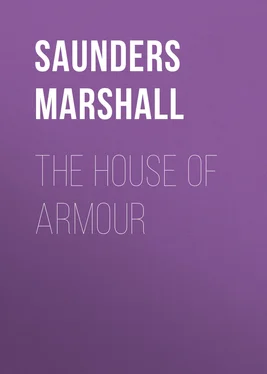Marshall Saunders - The House of Armour
Здесь есть возможность читать онлайн «Marshall Saunders - The House of Armour» — ознакомительный отрывок электронной книги совершенно бесплатно, а после прочтения отрывка купить полную версию. В некоторых случаях можно слушать аудио, скачать через торрент в формате fb2 и присутствует краткое содержание. Жанр: foreign_prose, foreign_antique, на английском языке. Описание произведения, (предисловие) а так же отзывы посетителей доступны на портале библиотеки ЛибКат.
- Название:The House of Armour
- Автор:
- Жанр:
- Год:неизвестен
- ISBN:нет данных
- Рейтинг книги:4 / 5. Голосов: 1
-
Избранное:Добавить в избранное
- Отзывы:
-
Ваша оценка:
- 80
- 1
- 2
- 3
- 4
- 5
The House of Armour: краткое содержание, описание и аннотация
Предлагаем к чтению аннотацию, описание, краткое содержание или предисловие (зависит от того, что написал сам автор книги «The House of Armour»). Если вы не нашли необходимую информацию о книге — напишите в комментариях, мы постараемся отыскать её.
The House of Armour — читать онлайн ознакомительный отрывок
Ниже представлен текст книги, разбитый по страницам. Система сохранения места последней прочитанной страницы, позволяет с удобством читать онлайн бесплатно книгу «The House of Armour», без необходимости каждый раз заново искать на чём Вы остановились. Поставьте закладку, и сможете в любой момент перейти на страницу, на которой закончили чтение.
Интервал:
Закладка:
“Turnips, beets, parsnips, carrots, squash–”
“Well, give us some of each, but we’ll have to get the boy to help us carry them. We never can take all these things. And cranberry sauce, don’t forget that. Pickles, Zeb? Do you want some of them? Very good, we’ll have a bottle. Have you made your mince pies yet? No. Well, we’ll have a lemon one and a strawberry tart and some fruit. Will you have grapes or oranges, Zeb?”
“Dates, and figs, and nuts,” gurgled the child in almost speechless delight.
Stargarde stifled a laugh. “So be it Mary, and cheese and crackers for Dr. Camperdown. Now Zeb let us take this basket and run home and Mary will send the rest.”
Camperdown looked up in amazement as the two burst into the room. “What’s the excitement?” he said, getting up and standing with his back to the fire. “Here, let me put your basket on the table. What’s all this?”
“Dear Brian,” said Stargarde breathlessly, “you must not talk. Only help us. Set all these dishes on the hearth to keep hot. I should have set my table before we went to the restaurant. Alas, I am a poor housekeeper. Zeb dear, here is the cloth; spread it on the table; and Brian do help her to put the knives and forks and plates around. I will make the tea or coffee—which would you rather have?”
“Coffee for me, if it’s dinner,” said Camperdown. “I smell meat, don’t I? What do you call this meal, anyway?”
“I call it anything,” said Stargarde, “only it must be eaten hot. Cold things are detestable.”
“Tea for me,” piped up Zeb shrilly; “I hates coffee.”
Stargarde uncomplainingly searched in her cupboard for two vessels instead of one—brought out a small earthenware teapot and a tin coffeepot, and set them on a trivet which she fastened to the grate. Then finding a small kettle, she filled it with water and put it on the glowing coals.
“I call this pleasant!” exclaimed Dr. Camperdown a few minutes later. The dishes were all nicely arranged on a cloth as white as snow. He had a spotlessly clean but coarse serviette spread across his knees, and was flashing glances of admiration across the mammoth turkey before him at Stargarde, seated at the other end of the board. “I call this pleasant!” he repeated, picking up his knife and fork, “and a woman who serves a dinner smoking hot deserves a medal. My old dame thinks it a crime to put things before me more than lukewarm. I hear her coming up stairs with my dinner. Tramp, tramp—down on a step to rest. Tramp, hobble, up again—down on another, just to aggravate me—bah, I’ll dismiss her to-morrow!”
Stargarde looked at him without a shadow on her resplendent face. “You are like the dogs, Brian,” she said gayly; “your bark is worse than your bite. You love that old woman, you know you do.”
“I don’t love any one,” he growled. “You’re not eating anything there. Stop fanning yourself and attend to your plate—have some more turkey. This is a beauty. Where did he come from? The country, I’ll wager. This isn’t city flesh on his bones.”
“Cornwallis,” said Stargarde thoughtfully. “Unfortunate creature—I wish we did not have to eat him.”
“Now Stargarde,” said the man warmly, “for one meal, no hobbies. Let the S. P. C. and the G. H. A. and the L. M. S. alone for once. Talk nonsense to me and this young lady here,” turning politely to his fellow-guest.
His term was inadvisedly chosen, and Zeb flashed him a wicked glance over the bone that her little, sharp teeth were gnawing. Stargarde to her dismay saw that there was a smouldering fire of distrust and dislike between her two guests, that at any moment might break into open flame. Zeb was jealous of Dr. Camperdown. With ready, quick suspicion, she divined the fact that his sympathies were not with her kind. He would take away from her and her fellow-paupers the beautiful woman who at present lived only for them, and she hated him accordingly.
She had only recently come to Halifax. She had experienced different and worse degrees of misery in other cities, and now that a new, bright world was dawning upon her, it was not pleasant to know that her benefactor might be snatched at any moment from her. So she hated him, and he almost hated her as a representative of a class that absorbed the attention of the only woman in the world that he cared for, and who, but for them, would, he knew, devote herself to the endeavor of making more human and more happy his present aching, lonely, miserable heart.
Aware of all this, Stargarde kept the conversation flowing smoothly in channels apart from personal concerns. She talked continuously herself, and laughed like a girl full of glee when the moment for changing the plates having arrived, Dr. Camperdown and Zeb politely rising to assist her, left the table deserted.
When they reseated themselves she drew Zeb’s chair closer to her own, for she saw that the child had satisfied her hunger and at any moment might commence hostilities.
“Will you have some tart, Zeb?” she asked kindly.
“Oh, land, no!” said the child; “I’m stuffed. Give it to piggy there. He’s good for an hour yet,” and she pointed a disdainful finger to the other end of the table.
Dr. Camperdown had a large appetite—an appetite that was, in fact, immense, but he did not like to be reminded of it, and looked with considerable animosity at the small child.
“Do not pay any attention to her, Brian,” said Stargarde rapidly in German, then she turned to Zeb. “Dr. Camperdown had no dinner. He is hungry. Won’t you go and look at those picture books till we finish?”
“I don’t want ter,” said the child, as she nestled closer to her, “I likes to be with yer.”
What could Stargarde do in the face of such devotion? She left Dr. Camperdown to his own devices, and cracking nuts for the child searched diligently for a philopena. Having found one she shared it with her, related the pretty German custom concerning it, and promised Zeb a present if she would first surprise her the next day.
Zeb listened in fascinated attention, only throwing Dr. Camperdown a glance occasionally, as much as to say, “You see, she is giving me her undivided attention now.”
And he was foolish enough to be restive. “If he would only be sensible—two children together,” murmured Stargarde, as she got up to pour him out his coffee. As a student of human nature, she was amused at the attitude of the professional man toward the outcast; as a philanthropist, she was fearful lest there should be driven away from her the little bit of vicious childhood that she had charmed to her side.
“If he would only be sensible and think of something else!” she went on to herself. “They’ll come to an open rupture soon. I must try to restrain Zeb, for she, alas, is capable of anything. I won’t look at him as I give him his coffee.”
Unfortunately she was obliged to do so, for as she set it before him, he said childishly, “Do you put the sugar in,” thereby obliging her to give him a remonstrating glance.
Zeb saw the blue eyes meet the admiring gray ones and immediately issued an order in her shrill voice, “Gimme a cupper tea.”
Stargarde could not scold people. She was a born mother—loving and patient and humoring weaknesses perhaps to a greater degree than was always wise. She patiently waited upon her second troublesome guest, and sat down beside her without saying a word, but in an unlucky instant when she was obliged to go to the cupboard for an additional supply of cream, the war broke out—the deluge arrived.
Zeb, filling her mouth with tea, adroitly squirted a thin stream of it the whole length of the table across Camperdown’s shoulder.
He saw it coming, and uttering a wrathful exclamation, jumped up from his seat. Stargarde heard him, and turned around hastily just in time to hear Zeb say contemptuously, “Oh, shut up—you’ll get it in the mouth next time.”
Читать дальшеИнтервал:
Закладка:
Похожие книги на «The House of Armour»
Представляем Вашему вниманию похожие книги на «The House of Armour» списком для выбора. Мы отобрали схожую по названию и смыслу литературу в надежде предоставить читателям больше вариантов отыскать новые, интересные, ещё непрочитанные произведения.
Обсуждение, отзывы о книге «The House of Armour» и просто собственные мнения читателей. Оставьте ваши комментарии, напишите, что Вы думаете о произведении, его смысле или главных героях. Укажите что конкретно понравилось, а что нет, и почему Вы так считаете.












